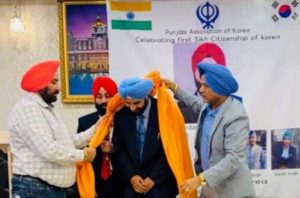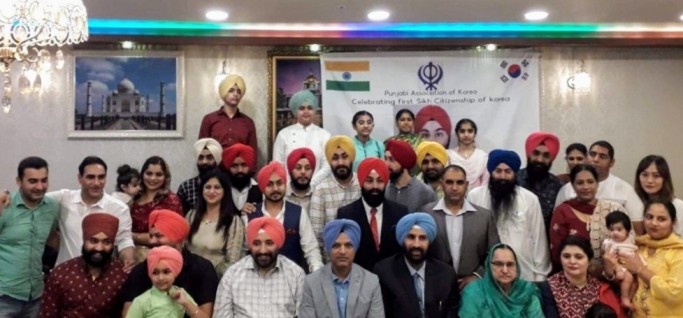Proud Moments: Sikhs in Korea now can acquire citizenship while keeping their articles of faith intact
Earlier, the Sikh community seeking Korean citizenship was not having their turbans and long beards when taking an identity card and passport photo.
SEOUL: Daljinder Singh (45), his wife and three children become the first Sikh family in South Korea to attain Korean citizenship and passport, and yet upholding their articles of faith that includes turban, beard, and others.
Earlier people from the Sikh community seeking Korean citizenship were not having their turbans, and long beards when taking an identity card and passport photo. Prior to this some members of the Sikh community had acquired a Korean passport but without a turban and long beard.

With this change, Daljinder Singh – a businessman from Amritsar town of Punjab state of India, who moved to Korea about twenty years back, becomes the first practicing Korean Sikh. Likewise, his family becomes the first Korean Sikh family in Korea practicing its faith with complete religious freedom and dignity.
Korea has about 10,000 Indians living and working, and about 550 of them are Sikhs.
Immediately after the Korean Immigration department of Ministry of Justice accorded citizenship to Daljinder Singh and family, the Punjabi Association of Korea – the representative body of the Punjabi community honored the family.
While felicitating the family, Dr. (Prof.) Lakhvinder Singh, President, Punjabi Association of Korea, said, “This is a great transition for the Sikh community in Korea. Slowly but surely South Korea is becoming a multicultural society in which cultural differences and racial diversity are not only tolerated but actually encouraged.”
“Today at the official and societal levels there is an acknowledgment that ethnic and racial minority groups who earlier have not had the right to become full members of Korean society, now have the fundamental right to maintain their specific ethnocultural identities. New Multicultural Korea is being born as we speak. Multiculturalism being practiced in Korea today is providing a new ray of hope for Korean Sikhs,” Dr. Singh added.

The Sikh community facilitated Dr. (Prof.) Lakhvinder Singh with the ‘Robe of Honour’ during this event held in Seoul.
While talking about her husband Daljinder Singh, Ms. Navgeet Kaur said she was proud of him for being the first practicing Korean Sikh, and also for making his family the first Korean practicing Sikh family.
“At times when he would go out at public places with a long beard and covered head, the children in Korea would call him Santa Claus. And I always took it positively and in good humour. He takes about two and a half hours to get ready in the morning as he is a proud practicing Sikh. I hope, the Sikh community grows in great number and earn accolades for their good deeds in Korea too as it has done in countries like America, Canada, and others” she added.
Further, as a sign of a Korea having a liberal and open policy, five other Sikh children are also able to keep their articles of faith while changing their nationality. Sukhjeet Singh, Ms. Sukhmeet Kaur, Ms. Japneet Kaur, Arshot Singh, and Gurjot Singh are the proud first Korean Sikh children practicing their faith in the open and having big dreams for their future.

Arshot Singh (12) especially is looking forward to joining the Korean army in a few years’ time as he comes of his age and be the first Korean Sikh to serve and rise to higher ranks.
“If and when it happens, it is bound to take the India-Korea defense and military cooperation to new heights with Sikhs serving in both Indian and Korean armies, defending democracy and our shared way of life. Sikh soldiers are known for their bravery and raw courage all over the world. Sikhs serving in the Korean military is going to be a game-changer for a closer and stronger partnership between our two great nations,” said Dr. Lakhvinder Singh.
Dr. Lakhvinder Singh who is a part of a think tank in Seoul and a renowned authority on global affairs has been living in Korea for the last 23 years, and working relentlessly for the cause of the Sikh community and strengthening powerful defense partnership between India and Korea.
“Sikhs are known for their hard-working nature. With their sheer hard work, they have earned great respect in their new adopted homes all over the world. In Europe and America, they are already serving in high government positions including cabinet ministers. In Korea now they are starting a new journey and hope to earn their due place in Korean society in due time,” said Dr. Singh.
While their place of worship, called Gurdwara Sahib, was established in 2001 it is yet to be recognized by the government as a place of worship.
“Time has come for the Korean government to officially recognize the Sikh religion in Korea and provide the necessary tools to the community to reach their fullest potential in their new adopted home. Entire Sikh community in Korea is raring to tread the extra mile to contribute their bit for commissioning a large and world-class Gurudwara Sahib,” Dr. Singh culminated.




I lived in Korea while on assignment from my American employer from 1991 to 1994 as a Sikh . I was in Seoul most of time and then in Ulsan for commissioning of chemical plant. That time there were two more Sikhs in Seoul. As a Sikh I had no problem to live there and Koreans were very respectful to me